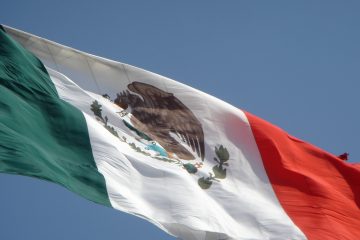OxPol Blogcast Episode 4: Mexico’s Midterm Election
Welcome to the OxPol Blogcast, a podcast where we will be sharing research, analysis, and experiences from members of the University of Oxford’s Department of Politics and International Relations. On each, episode we will talk to a guest about a piece they’ve written for the OxPol Blog. Then, we’ll discuss their larger research agenda, their insights on conducting political science, and their time at Oxford. On this episode of the OxPol BlogCast, host Chase Harrison talks to DPhil student Javier Pérez Sandoval about Mexico’s upcoming midterm election, theories of voter choices, and analysing democracy at the subnational level. Read the original blog post here: https://blog.politics.ox.ac.uk/a-return-to-the-right-for-mexico-foucaults-pendulum-and-missed-political-opportunities/ Views expressed on this podcasts are those of the guests alone and are not representative of …
A Return to the Right for Mexico? Foucault’s Pendulum and Missed Political Opportunities
In June 2021, amidst the COVID-19 pandemic, Mexico will face what is bound to be one of the most complex mid-term elections the country has seen in the last two decades. At stake is control of 15 (out of 32) governorships, 30 state legislatures, 1,900 municipalities and a complete renewal of the Lower Chamber of Congress. The outcome will clearly be either a punishment or a reward for the leftist administration of Andrés Manuel López Obrador (AMLO) and the ballots cast this summer will undoubtedly make or break the second half of his presidency. The extent to which the COVID-shock has impacted individual political preferences in Mexico remains unclear. Looking at the most recent available data to conduct an exploratory …
A Battle for Morena’s Soul: Mexico’s Ruling Party’s Chaotic Leadership Election
One of the great surprises of the 2018 Mexican election was not the largely predicted landslide victory of Andrés Manuel López Obrador but the commanding performance of his political party, Morena. In just its second federal election, Morena won a vast legislative majority in the federal Congress and control of state governments across the country. The party was a relative newcomer on the scene— it was founded just 5 years prior as a civic project of the left. However, in the run-up to the 2018 election, the party ballooned in size, absorbing members from across the political spectrum. Still, Morena was able to present itself as a fairly unified front in the 2018 election. However, in the past few months, the once latent internal …

Confronting Mexico’s New Black Market in Fuel Theft and Trafficking
Inaction in politics can be comfortable. Politicians might opt for hand wringing to avoid confronting the consequences of their actions, or, in the worst-case, to hide their own complicity. Mexico´s new administration has been in the headlines recently for doing just the opposite: On December 27th of last year, president Andrés Manuel López Obrador announced that his government would confront the large-scale theft of fuel that affects Petróleos Mexicanos (PEMEX). Since then, there have been widespread news of lines and fuel shortages. The situation escalated further on January 18 with the horrific news of 73 people killed and another 76 gravely injured from the explosion of a fuel pipeline in the state of Hidalgo. Mexico´s New Black Market What the …

Mexico’s Election: The Good, the Bad and the Ugly
Come Sunday at 6 p.m. (GMT-5) Mexican citizens will have had elected not only a new president, but also over 3,400 new public officials. Being the largest electoral process in Mexican history, this third federal voting round in the post-transition era determines not only Mexico’s future, but —along with several other elections in the region— it also helps configure the ideological composition of Latin America. Instead of providing an overview of the contenders or discussing the trade-offs and the potential risks of the populist left, I will a) assess the campaign, b) zero in on the topics to look out for during and after election day and lastly, I will also c) identify key challenges for the future. My assumption or rather …









